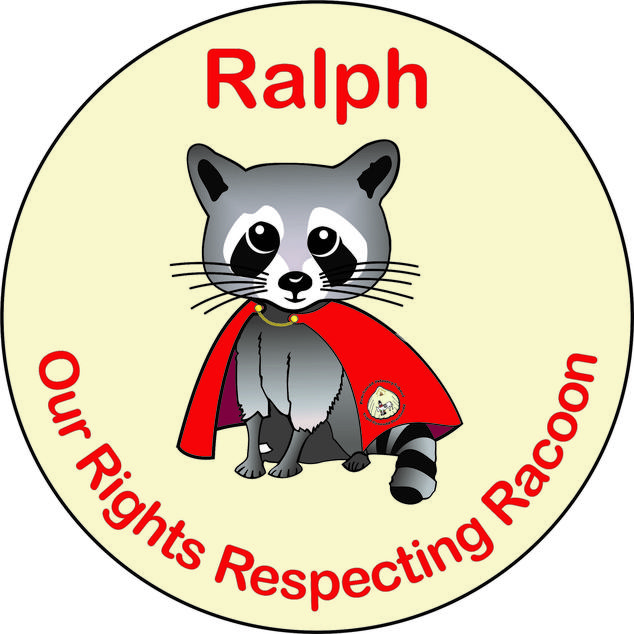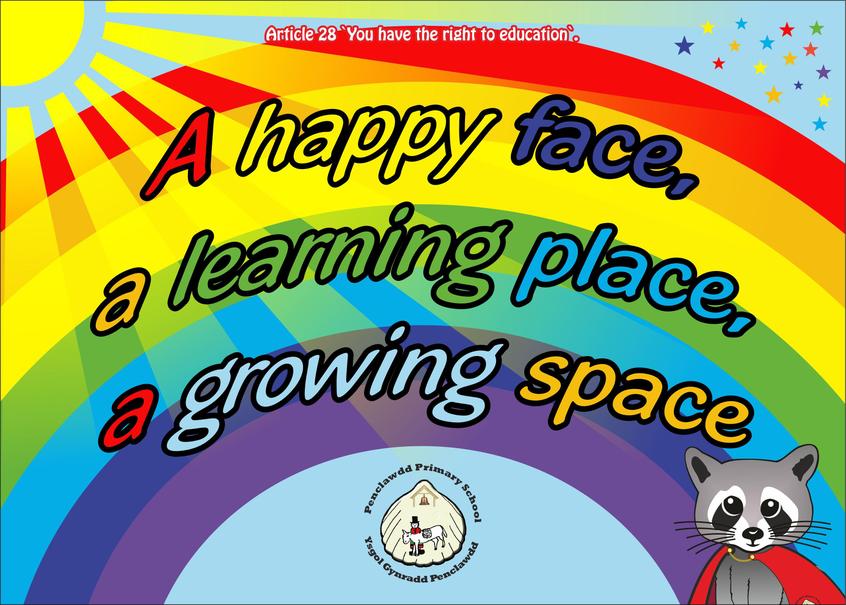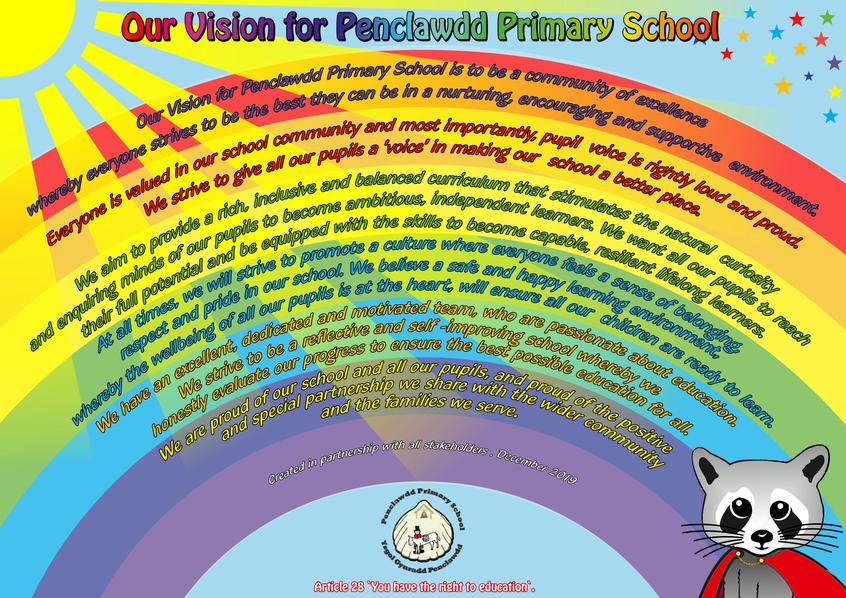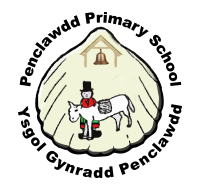Our PPS Curriculum Summary
Introduction
Curriculum design is an ongoing process of continuing improvement. At Penclawdd Primary School, we recognise that we have both mandatory and statutory duties.
The Curriculum and Assessment (Wales) Act 2021 puts mandatory duties on schools - things they are legally required to do. Schools must also have ‘due regard’ to statutory guidance when carrying out their duties.
Please click here to access a summary, which explains the difference between ‘mandatory’ and ‘statutory guidance’, and sets out the requirements in clear, bulleted form.
The headteacher and the Governing Body jointly adopt our curriculum and assessment arrangements through ratification of policy and practice. It is continually kept under review through the school's self-evaluation processes.
Practitioners, learners, parents, carers and the wider community are consulted with regularly. Curriculum design is constantly reviewed in light of feedback from a variety of stakeholders. eg Forms regarding curriculum design, questionnaires, pupil voice groups etc
An introduction to creating our Curriculum
Our School Curriculum covers all aspects of the skills, knowledge and experiences that pupils will encounter whilst learning at our school. This section of our website has been created to provide you with a summary of our School Curriculum We hope that this will give you a good idea of what our Curriculum looks like, and what your child will be learning at school.
Our current Curriculum was put in place in 2008 by Welsh Government and, as you’d agree, a lot has changed in that time! The skills, knowledge and experiences that our Pupils need in 2022 and beyond are very different to those of the past, and so the new curriculum is something that is very much welcomed by Schools across Wales.
At Penclawdd Primary School , we have been working hard since 2018 in preparing for this rollout ( see roadmap) . We have worked together with our various stakeholders, including our cluster , NGP , to establish and create a new Curriculum for our Schools, in line with the statutory guidance produced by Welsh Government ‘Curriculum for Wales’, which we feel now reflects the views and opinions of everyone involved in the process.
This piece of work has taken a number of years to put in place; not only focussing on content and skills, but embedding and developing our approaches to teaching and learning, ensuring that our Schools are ready and prepared for the roll out of the new Curriculum in September 2022.
Our work has involved a range of different groups through a range of different ways; seeking input from Parents via online questionnaires, meeting with Staff to discuss skills and progression, talking with Governors regarding the vision for our Curriculum and of course, most importantly, discussing the new curriculum with our learners. As a result of the work carried out by the school we are now in a position to begin introducing our new Curriculum in September 2022.
Designing and creating a Curriculum is a lengthy process, as we consider what it is that our Pupils need to learn whilst they are with us, and how we build this up over their Primary journey and on into their secondary education. We have aimed to ensure that as many people as possible have been able to help shape this, including external professionals, and as a result we have developed a Curriculum that we feel will truly provide our Pupils with a rich experience of education.
Curriculum Content
At Penclawdd we use an overview of what Pupils in each year group within the school will be able to experience as part of our progressive Curriculum, whilst also understanding that this is flexible and that we will always utilise Pupils interests and experiences in directing the teaching and learning that takes place in the classroom.
It is not a detailed list, but a summary of what your child will develop at school.
Pupil Voice - Article 12
 We are a Silver Rights Respecting School and Pupil Voice is at the centre.
We are a Silver Rights Respecting School and Pupil Voice is at the centre.
- Senedd members are elected interviewed or voted for by the children.
- Pupil groups develop action plans which help to improve the school and enhance learning experiences for all.
- Children understand how they learn best and choose their own style.
- Pupils link with other community groups to have their say on their local area
- Children develop ideas and lead their learning through pupil planning and reflections
Experiences
We learn about our locality and make links nationally and internationally. There are many exciting visits during the year to engage pupils and enhance learning. Penclawdd Primary School encourages children to experiment in fun and engaging hands on activities to help develop understanding. Children can attend a range of extra curricula clubs either during or after school. Children have lots of opportunities to learn in outside in our beautiful school grounds.
We invite professionals in to share their real life knowledge , experience to ensure authentic real life contexts.
Pedagogy
Our planning is centered around the 12 pedagogical principles. Staff conduct their own action research to improve our practice and results. We share good practice with other schools and organisations in the cluster.
The 4 Purposes
This Curriculum summary aims to provide an overview of what our Curriculum involves and how our Curriculum meets the requirements of the Curriculum for Wales, including the importance of the 4 core purposes of Education.
The 4 purposes is at the heart of the our curriculum. These are integral for all decisions on the content and experiences developed as part of the curriculum to support all children and young people to be:
- ambitious, capable learners ready to learn throughout their lives.
- enterprising, creative contributors, ready to play a full part in life and work.
- ethical, informed citizens of Wales and the world.
- healthy, confident individuals, ready to lead fulfilling lives as valued members of society.
Our Curriculum Vision and Motto

This illustrates our stakeholder Vision for learning and teaching :

In addition to our whole school vision, we are working as a School Community to establish individual visions for each area of the new curriculum. The new curriculum is split into 6 key areas (known as ‘Areas of learning and Experience’ or AoLE) which are :
- Expressive arts.
- Health and Well-being.
- Humanities (including RVE)
- Languages, Literacy and Communication (including Welsh)
- Mathematics and Numeracy.
- Science and Technology
Meeting the required elements of the Curriculum for Wales
From our Curriculum Design Work, we have established a Curriculum ( see below ) that meets the required elements of the Curriculum for Wales, whilst providing a rich and interesting knowledge base. We feel that our New Curriculum;
- Enables learners to develop in the way described in the four purposes above
- Provides for appropriate progression across the school, according to the principles of progression set out in the ‘Progression Code’
- Is suitable for learners of differing ages, abilities and aptitudes
- Is broad and balanced
- Encompasses the concepts set out in the statements of what matters in the ‘Statement of What Matters Code’
- Provides for learning and teaching that encompasses each of the Areas of Learning and Experience
- Includes Welsh language development opportunities, RSE and RVE
- Promotes Cross-Curricular skills
Implementing the Curriculum
As part of our implementation of the New Curriculum, careful consideration has been given as to how we will effectively implement the new Curriculum within Penclawdd. When planning for implementing our Curriculum we aim to ensure that the Curriculum is implemented in a way that;
- Enables all learners to develop in ways described in the four purposes
- Secures learning that offers appropriate progression for each learner
- Is suitable for each learners age, ability and aptitude
- Take account of each learner’s additional learning needs (if any)
- Secures broad and balanced learning and teaching for each learner
- Encompasses elements of English and Welsh, the cross-curricular skills and RSE and RVE
Assessment and Securing progress within the Curriculum
At Penclawdd Primary School we understand that all Pupils bring with them their own skills, knowledge and experiences when they start school. We know that children do not all start at the same starting point and that our job as a school is to identify where Pupils are on their learning journey and to plan the teaching and learning necessary to move them on. Within the school we use a range of strategies and approaches to assessment which inform our teaching and learning process within the class setting. As a school we will make use of a wide range of assessment approaches and more information about how we will assess your child’s progress at school can be found in our Teaching and learning policy. As a summary our schools will utilise:
- Personalised Assessments (as part of the National Approach)
- Baseline assessments
- Standardised Assessments (for diagnostic purposes)
- Staff Professional Judgements
- Skills tracking
- Marking and Feedback
Children reflect on targets and identify their own next steps to success. They use the purple pen for this. A range of AfL strategies provides a snapshot assessment to inform our practice. Learners have the opportunity to self and peer assess their work and support each other to suggest ways to develop. Effective questioning help children to move their learning forward. Together with the teacher pupils set targets and monitor their progress.
Learning experiences
Our curriculum is unique to our school and puts pupil voice at the centre. Through creative and meaningful activities, pupils experience a thematic approach to learning that helps them create connections and learn through memorable experiences that cater to all pupils.
Class topics
Broad class topics that focus on particular AoLEs are followed by each class in the school. Examples include the following:
- On our doorstep
- Frozen kingdom
- Misty Mountains
- Blue Abyss
- Fairy Tales and castles
- Cynefin
EPIC - Everyone planning in class (Child-led planning)
Missions
Each class share their BIG question and key concepts for learning at the start of the term and learners have sessions where they plan what they’d like to learn about from the topic and set class challenges/missions. As the topic evolves, children add additional ideas to the EPIC board for completion. From these ideas, differentiated missions (one star. two star and galaxy missions) are set for the children to complete. In Y3 - 6, children develop an independent success criteria and self/peer assess their work when complete.
The learning journey
Engage
A stage of learning that provides children with an inspiring and thought provoking starting point that stirs curiosity and initiates interest. Children engage in purposeful and contextualised learning experiences; in and outside the classroom, making best use of partners, experts and the community to provide the stimulus to learn. To ensure that children are immediately ‘engaged’, teachers provide a range of memorable experiences and starting points that stimulate children's interests in a particular theme or concept.
Develop
A stage of learning that provides children with an opportunity to develop and master key skills, subject knowledge, research techniques and independence. Children become industrious learners making sense of information and experiences, leading to sound understanding and progress. Children DEVELOP their knowledge, understanding, key and subject skills required to progress their learning and attainment through quality differentiation, focused learning tasks and high quality relevant learning experiences.
Innovate
A stage of learning that challenges children’s ability to work creatively, exploring possibilities and finding solutions. Using and applying previously learned skills, knowledge and understanding children work collaboratively to innovate, managing their own learning to achieve given success criteria. Teachers provide an imaginative and relevant provocation or scenario that provides opportunities to observe how successfully children can use, apply and problem solve in creative and imaginative ways.
Sharing the learning/ Express
A stage of learning that empowers children to share, celebrate and reflect with a range of partners and audiences. Children cement their learning through shared reflection with peers and other adults and are able to suggest next steps of learning. Teachers discuss, review and support individual and group evaluations using their observations and evidence to make summative assessments.
Shoot for the stars at Penclawdd
We believe in having a ‘Growth Mindset’ and have cultivated a positive ‘learning to learn’ mindset across the school, where learners are taught the importance of being resilient, resourceful, reciprocal and reflective in their learning. Rooted in Vygotsky’s theory about the ‘zone of proximal development’, we believe in scaffolding, supporting and then challenging all learners to achieve. Our ‘Star Challenges’ have developed from this desire to ensure that we never put a ‘ceiling’ on our learners’ learning and that we always allow them to take their learning as far as they want to go! In this way, the ‘Star Challenges’ have enabled our learners to take ownership of their own learning as they strive to become ‘Ambitious, Capable Learners’. Learners are encouraged and supported to self-select their initial ‘Star Challenge’ stage but can choose to move to another ‘Star Challenge’ stage as and when appropriate, depending on their understanding of the learning. Star Challenges are a brilliant tool for any teacher to work with differentiation, they provide motivation and aspiration for all learners. Each child can have access to a 1 star, 2 star or a galaxy challenge.
Reviewing the Curriculum - working together
We understand that the process of designing and implementing a Curriculum is one that is done so with an element of flexibility; understanding that as the world around us changes, so to do the skills and knowledge that we deliver to Pupils. It is our aim to continually revisit and revise our Curriculum to ensure that it remains fit for purpose and meets the needs of our learners.
Our Curriculum will be reviewed termly to ensure that there is appropriate coverage of skills within the school, which will be part of our usual monitoring processes. We will monitor, evaluate and review our processes supporting each other to continuously drive our vision
The process of reviewing the Curriculum will be based on feedback received from Staff, Pupils and Parents and ongoing revision will be a key part as we refine and embed a Curriculum for all. We will also continue to work closely with our NGP cluster of schools ,other schools, LA and institutions in ensuring that our Curriculum continues to be an effective tool for supporting the teaching and learning process within our schools. Through feedback from all stakeholders we develop our school improvement plan ensuring the targets meet the needs of the school and its learners.
We will work with the cluster to develop assessment arrangements as they adapt to the new curriculum requirements
If you would like any further information about our Curriculum and approaches to teaching and learning please feel free to visit our website where further details about our Curriculum can be found.
Alternatively, you are welcome to get in touch with us at the school where we will be happy to discuss our Curriculum further with you.
Planning In the Moment at Penclawdd Primary School Nursery
At our school, in the Nursery, we embrace a "Planning in the Moment" approach. This child-centred methodology allows us to observe and respond to children's natural curiosity and interests as they unfold during play and interactions. By focusing on spontaneous opportunities for learning, we nurture creativity, independence, and critical thinking skills. This approach ensures that every child's unique needs and passions are supported, creating a dynamic and engaging environment where learning is meaningful and exciting.
Children in our Nursery feel respected and valued as their ideas are actively listened to and explored. The role of the adult is to teach by recognising opportune moments and responding effectively. Teaching strategies vary but include asking open-ended questions (though not too many), wondering and pondering with the children, modelling, coaching, facilitating, demonstrating, recalling, and narrating. Being child-led, children initiate play and conversation, enabling them to ask questions and explore their own paths. This teaching happens in the moment, during play, as the adult observes, plans, and provides appropriate next steps simultaneously. This to explore, develop, and practice the characteristics of effective learning.
An integral part of our practice is recognising and supporting schemas—repeated patterns of behaviour that children use to explore and understand the world. By identifying these schemas, we tailor opportunities that align with each child's interests and developmental stage, creating meaningful experiences that deepen learning and enhance cognitive, social, and physical development.
Alongside this, our Nursery practice is guided by core principles for key AoLEs (Areas of Learning and Experience). These principles provide a balanced and holistic approach to education, fostering essential skills, well-being, and a lifelong love of learning.
What Is Planning in the Moment?
Planning in the Moment builds on what the child is interested in at a given moment, allowing their learning to deepen and lead to better outcomes. Unlike traditional 'topic planning,' this approach completes the planning cycle in real-time rather than in advance.
“Let the children choose what to do, join them, and support them in their pursuits. Then write up what has happened.”
– Anna Ephgrave, Planning in the Moment with Young Children
This approach is grounded in the belief that children possess a natural curiosity and an innate desire to learn. Rather than directing them through pre-planned activities, teachers take on a supportive, observational role, empowering children to take the lead and explore their interests. This method encourages independence, creativity, and deeper engagement, giving children the freedom to choose activities they enjoy while being subtly guided to extend their learning.
Planning in the Moment can be broken into three phases:
- The Child’s Spark – The initial moment when a child shows interest in something, characterised by fascination and focus.
- The Teachable Moment – The child, extending their interest through open-ended questions and integrating this curiosity into broader learning opportunities.
- The Documentation – Observations are recorded, detailing the spark, the teachable moment, and subsequent actions. This helps monitor each child’s progress and tailor the environment to their needs.
Creating the Right Environment in Our Nursery
For Planning in the Moment to succeed, an enabling environment is essential. Open-ended materials play a crucial role in creating spaces where all learning areas and characteristics can be explored. Many of our resources are readily accessible, giving children the freedom to choose and engage with materials that interest them.
The environment is often referred to as the "third teacher," reflecting the children's interests and needs. Using their interests ensures sustained engagement, enabling deeper learning. Our environment—both indoors and outdoors—builds curiosity, imagination, and motivation, inviting children into deep-level play. At Penclawdd Primary School, we are fortunate to have a spacious nursery room, which we utilise with the philosophy that "less is more," focusing on versatile resources like loose parts to support open-ended play.
The Importance of Thinking Time in Our Nursery
We value the importance of “thinking time” for both children and staff. This approach allows our team to observe and understand each child’s interests and needs, responding in ways that support their natural curiosity and development.
By giving children, the space to explore and problem-solve independently, we encourage critical thinking, creativity, and confidence. Thinking time ensures that learning is child-led and meaningful, fostering a nurturing environment where every child can thrive at their own pace.
Estyn, October 2024:
Professional learning for staff is precise and purposeful. Through robust research and training, they have developed a strong understanding of child development. Overall, staff know their pupils well, using well-honed skills of observation, questioning, and teaching to facilitate and modify high-quality outdoor learning opportunities that consistently meet pupils’ needs.
Nearly all pupils enjoy learning outdoors and are keen to share their experiences. Their play refines social skills, such as turn-taking, and builds resilience as they persevere with activities until progress is made. Pupils’ physical skills thrive through opportunities to run and explore open spaces, while their creativity and self-expression flourish.
